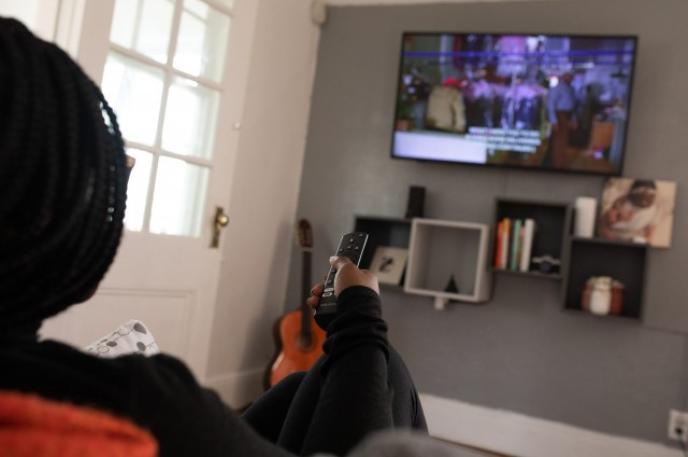
Positive representation of Black people proves impactful through the years
December 23, 2020
This blog was written as part of Charlotte Mecklenburg Library's Black Lives Matter program initiative. Learn more about the program and corresponding events here.
Recently, HBO Max aired The Fresh Prince of Bel-Air Reunion, a wonderful reminder of the excellence and portrayal of Black lives on television screens through the years. Indulging this taste of nostalgia was enough for me to reflect on the influence and impact Black representation through TV had on my life growing up in the 80s and 90s. My mother was a library staff member, and my whole life was surrounded by books. Still, I always loved the visual imagery and story of a good TV show, especially a Black one.
I was born in the 80s, so my palate for Black representation on TV shows up in my life to this day. I was privileged to grow up in an era where the onscreen expression of Black life and family surpassed the motif of the Black struggle which was prominently displayed in 1970s programs such as Good Times. Good Times was the first Black, two-parent family sitcom on television, and the show addressed serious topics that highlighted struggles with which Black families of the time could relate. While the portrayal of Black life on Good Times was just one perspective, the producers (who were mostly white) wanted to keep the narrative of the Black struggle going. This resulted in much controversy surrounding the storylines given to characters, and the actors were critical of the show's direction as well. They wanted to show Black people in more prominent roles that would have a lasting impact on generations to come.
Enter The Cosby Show in 1984. Although I was a terrible two when this show began, there is no denying the impact this show had on kids my age. When I was old enough to tell time, I made sure that I was sitting in front of the TV to view this show in syndication every week. The Cosby Show highlighted a different perspective of Black life than what was shown by Good Times. Both shows possess something magical and relatable - Black culture along a spectrum - Black culture is rich. Still tackling Black people's issues with a comedic tone and setting us up to learn lessons, this Black, two-parent family expanded the sphere of a Black family's lived experiences. While not precisely emulating my childhood family life, it greatly impacted how I see family dynamics and relationships — I grew up wanting to be a lawyer because of Claire Huxtable. Her role as a Black woman, mother and professional set the standard for me. Her "I'm every woman," graceful, powerful and strong demeanor captivated me in a way that helps me show up in spaces as a whole human. Representation did that.
The children on The Cosby Show were different, and I could see the personalities of Sandra, Denise, Theo, Vanessa and Rudy reflected in the kids that I grew up around. Perhaps the Cosby kid's life that I followed most was that of Denise. Like many of my peers, I took the journey with her to Hillman College in the spin-off series, A Different World and I fell in love (it is my favorite TV show)! It exhibits the path that drove me to the halls of a higher learning institution; it forced me to independence and an experience that no one else in my family had yet taken. Because of A Different World, I dreamed bigger. I saw myself in each of the characters or what I thought I'd be one day. Those characters brought my dreams to life. Because of the representation that Dwayne, Whitley, Freddie, Kim, Ron, Jalisa and the rest of the gang displayed, I felt that going away to college was more attainable. I wanted it all! I wanted the experiences, I wanted to attend a historically Black college or university (HBCU) and to join a sorority all because of the impact and influence; most importantly, the representation of Black lives in these spaces. I learned that Black people are not monolithic - we all have different backgrounds and experiences that bind our Black existence and that is worthy of representation.
Now, I'm going to stop here at the most impactful Black television show in my life, but it’s certainly not the end of the representation that has been important for so many. I could go on, but I'm not trying to write a book - just a reflection of what Black representation did for my life.
However, I do want to briefly recognize some other shows as I close this article. Here’s a list of honorable mentions: The Fresh Prince of Bel-Air, Living Single, Martin, Moesha, The Parent'Hood and Roc. All of these Black shows and more are where I saw myself and many others in my life. These shows are at the intersection of hope and, sometimes, reality. The lives of Black people on TV remind me that Black books, Black films, Black music, Black art, Black TV, Black plays, and Black lives matter—representation matters.
So, where did you find your inspiration and representation on the small screen? And how has it shown up in your life as an adult?
As for me, I couldn't imagine where I'd be if I didn't have the fictional visuals of Black people's experiences present through Black media - especially TV.
--
This blog post was written by De’Trice Fox of Charlotte Mecklenburg Library.
